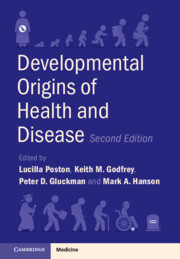Book contents
- Developmental Origins of Health and Disease
- Developmental Origins of Health and Disease
- Copyright page
- Contents
- Contributors
- Preface
- Section I Overview
- Section II Exposures Driving Long-Term DOHaD Effects
- Section III Outcomes
- Section IV Mechanisms
- Section V Interventions
- Chapter 17 Interventions to Prevent DOHaD Effects in Pregnancy
- Chapter 18 Interventions to Prevent DOHaD Effects in Infancy and Early Childhood
- Section VI Public Health and Policy Implications of Interventions
- Index
- References
Chapter 17 - Interventions to Prevent DOHaD Effects in Pregnancy
from Section V - Interventions
Published online by Cambridge University Press: 01 December 2022
- Developmental Origins of Health and Disease
- Developmental Origins of Health and Disease
- Copyright page
- Contents
- Contributors
- Preface
- Section I Overview
- Section II Exposures Driving Long-Term DOHaD Effects
- Section III Outcomes
- Section IV Mechanisms
- Section V Interventions
- Chapter 17 Interventions to Prevent DOHaD Effects in Pregnancy
- Chapter 18 Interventions to Prevent DOHaD Effects in Infancy and Early Childhood
- Section VI Public Health and Policy Implications of Interventions
- Index
- References
Summary
Numerous observational studies in mother-child cohorts have identified associations between adverse fetal exposures in utero and persistent consequences for the child in later life. These have prompted multiple randomized controlled trials (RCTs) in pregnant women to evaluate whether reversal of these exposures has the expected benefit for the health of the child. In this narrative review, the major categories of RCTs undertaken are introduced, and the outcomes addressed. In light of a preponderance of negative studies, reasons are explored including inadequacies in trial design and the rationale for intervening before conception, during pregnancy and after pregnancy.
- Type
- Chapter
- Information
- Developmental Origins of Health and Disease , pp. 177 - 188Publisher: Cambridge University PressPrint publication year: 2022

